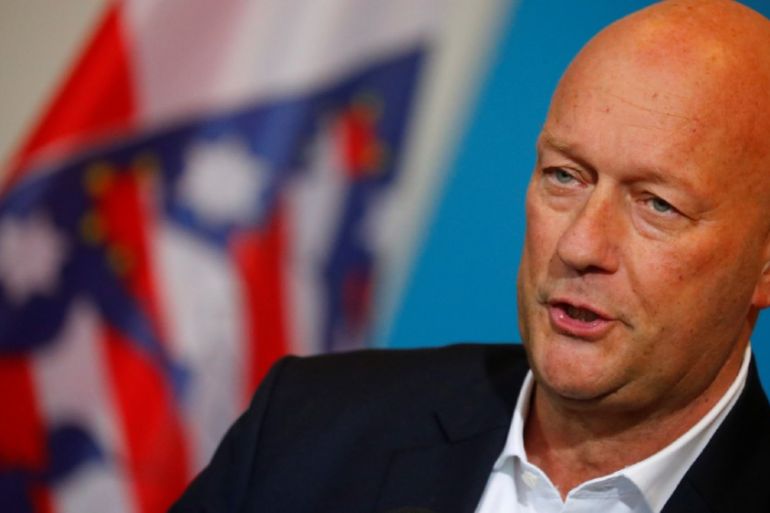Regional German president set to quit one day after election
The backing of the far-right AfD party for Thomas Kemmerich has paved the path to his swift resignation.

Berlin, Germany – The regional German leader whose election shattered political norms and unleashed a political storm on Wednesday, after relying on far-right votes to remove a left-wing government, has announced that he will seek to resign and dissolve the local parliament.
Thomas Kemmerich, of the liberal FDP party, told reporters his decision was necessary to remove the “blemish” of the votes he received from the Alternative for Germany (AfD). Chancellor Angela Merkel branded his receipt of support from the far-right party “inexcusable”, while other senior politicians compared the situation to the rise of the Nazi party.
Keep reading
list of 3 itemsGermany’s far-right AfD picks new leaders amid protests
It is time for Facebook to stop coddling the far right
“There was no cooperation with the AfD, there is not and will not be,” he said on Thursday afternoon, denying the previous day’s vote had been coordinated.
His bizarrely short tenure as minister-president, lasting a hair over 24 hours, could mean snap elections in the eastern state of Thuringia, though it remains unclear whether Kemmerich can secure the two-thirds majority required to dissolve the legislature, with the local branch of Merkel’s conservative CDU rejecting his plan.
In his brief, sometimes-vague news conference, Kemmerich suggested that if he did not secure the dissolution of parliament then he would call a no-confidence motion in himself, which would likely pass, meaning a replacement must be elected within three weeks or new elections called.
Wednesday’s vote was the first time in modern Germany that a government had been formed with the support of the far right, breaking an unwritten cordon sanitaire between the political mainstream and the AfD, and immediately sparked protests in Thuringia’s capital, Erfurt, and in cities across Germany.
“It was a historic event,” Kai Arzheimer, a political scientist at the University of Mainz, told Al Jazeera. “To accept the support of the AfD means reneging on an agreement between the democratic parties that has lasted for seven decades.”
Though the FDP barely received enough votes in October’s regional election to enter the Thuringian parliament, the existing coalition of the left, centre-left and greens fell just short of returning to power the incumbent, Bodo Ramelow, a veteran trade unionist from Die Linke, which placed first in vote share.
The AfD overtook the CDU to second place, under the leadership of extreme-right firebrand Jorg Hoecke, who has previously described Berlin’s Holocaust memorial as a “monument of shame”, and whose AfD faction, known as “the Wing” has been investigated by state security services.
With the CDU and FDP refusing to support the left bloc, voting entered a final third round on Wednesday in which the AfD swung behind Kemmerich, who won by 45 votes to 44.
Images of Kemmerich shaking hands with Hoecke sparked fury among the country’s senior politicians, with Ramelow tweeting a quote from Adolf Hitler, dated 1930, in which he brags about the Nazis’ role as kingmakers in Thuringia, which would later elect the country’s first Nazi government.
Annegret Kramp-Karrenbauer, the CDU leader and anointed successor to Merkel, warned of “consequences” for her party colleagues if they continued to support Kemmerich, while general-secretary Paul Ziemiak compared some AfD figures to national socialists.
FDP leader Christian Lindner thanked Kemmerich for making “the only right and possible decision”, and announced a confidence vote in his own leadership at a special meeting of the party’s executive on Friday.
The International Auschwitz Committee condemned the FDP on Wednesday, with Executive Vice President Christoph Heubner saying the party had “a huge problem of regaining credibility and trust”.
The dramatic events in Thuringia have provided a sharp reminder of the consequences of breaching the cordon sanitaire, according to Arzheimer, as well as exposing the fractures within the CDU and FDP over cooperation with the AfD.
“Both [parties] emerge from this with bloody noses and black eyes,” he added. “If there are fresh elections, I assume the CDU and the FDP will suffer [but] it’s not a foregone conclusion that this translates into more than marginal gains for the AfD, which has already performed very well in the last election and might be pushing against the limits of its potential.”